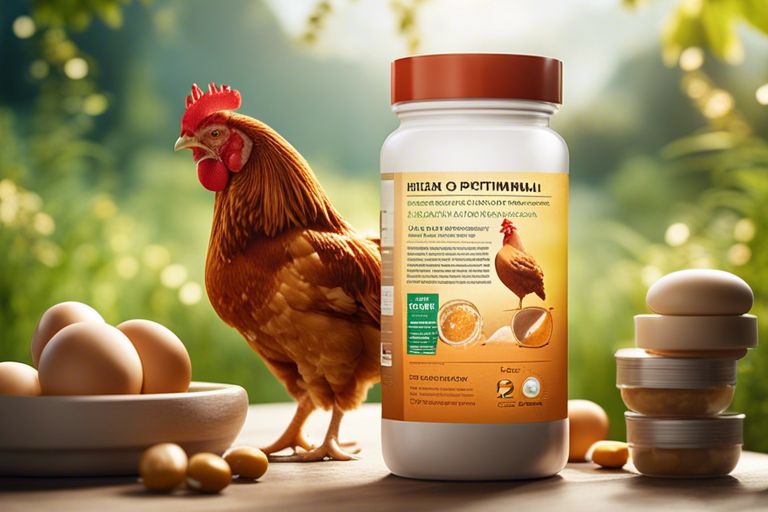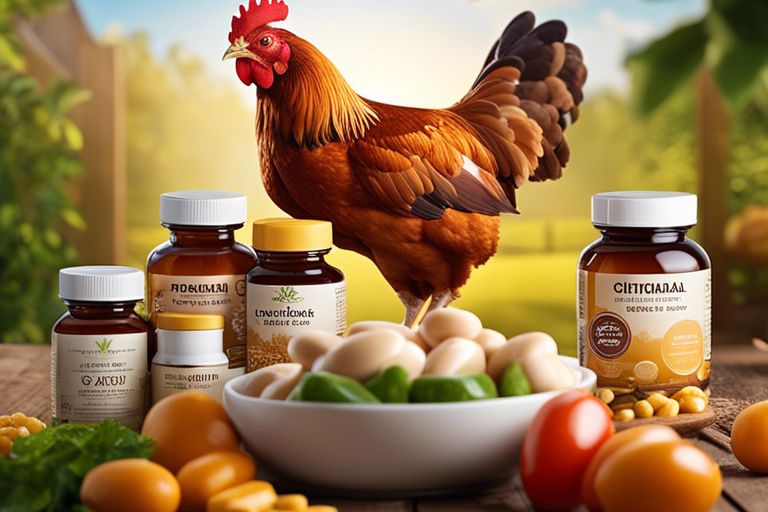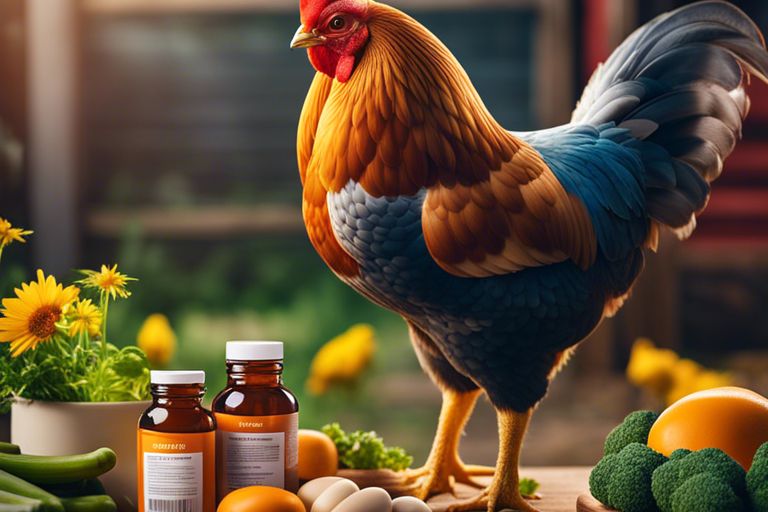Over the years, chicken health has become a top concern for poultry owners looking to maximize the well-being and productivity of their flocks. A key component in achieving this goal is ensuring the proper supplementation to address specific nutritional needs and promote overall health. In this list, we will probe into the top 10 crucial supplements that are vital for maintaining optimal health and performance in chickens.
Multivitamins
Boosts overall health
Your chickens deserve the best care to ensure they lead long and healthy lives. One way to support their well-being is by providing them with multivitamins. These supplements are specially formulated to provide a balanced combination of imperative vitamins and minerals that are crucial for your flock’s overall health.
Supports immune function
Even with the best care, chickens can still be susceptible to various illnesses. This is where multivitamins come in handy. By supporting your flock’s immune function, multivitamins can help boost their natural defenses against common diseases and infections. A strong immune system is vital for your chickens to stay healthy and thrive in their environment.
It is important to choose a multivitamin supplement that is specifically designed for poultry, as their nutritional requirements may differ from other animals. Look for products that contain key vitamins such as A, D, E, and B-complex vitamins, as well as important minerals like calcium, phosphorus, and potassium. By incorporating multivitamins into your chickens’ diet, you can help ensure that they are getting all the imperative nutrients they need to stay healthy and happy.
Calcium Supplements
Strengthens bones
Little is more crucial to the overall health and well-being of chickens than strong and healthy bones. Calcium supplements play a vital role in ensuring that your chickens have the necessary support for their skeletal structure. Without adequate calcium, chickens can develop weak bones that are prone to breakage and other health issues. By providing your chickens with the right calcium supplements, you can help them maintain optimal bone health and prevent common bone-related problems.
Enhances eggshell quality
Even the healthiest chickens require additional support to ensure the quality of their eggshells. Calcium supplements can significantly enhance the quality and strength of eggshells, reducing the chances of brittle or thin shells that can easily break. This is imperative for both the well-being of your chickens and the quality of the eggs they produce. By incorporating calcium supplements into their diet, you can help ensure that your chickens lay eggs with strong, durable shells that are less likely to break during handling or transport.

Probiotics
Improves gut health
If you want to ensure optimal health for your chickens, probiotics are a must-have supplement. The good bacteria in probiotics help to maintain a healthy balance in the gut, which is crucial for overall well-being. Probiotics can also help prevent common issues such as diarrhea and fungal infections in chickens.
Aids in digestion
Now, when it comes to digestion, probiotics play a key role in breaking down food and absorbing nutrients efficiently. This is especially important for chickens, as a healthy digestive system directly impacts their overall health and productivity. By including probiotics in their diet, you can help your chickens maintain a healthy digestive system.
Any imbalance in the gut can lead to digestive issues and nutrient deficiencies, which can affect your chickens’ growth and egg production. By incorporating probiotics into their diet, you can support their digestive health and ensure they are getting the most out of their feed.

Omega-3 Fatty Acids
Improves feather condition
To ensure optimal chicken health, incorporating omega-3 fatty acids into their diet is crucial. These important nutrients play a vital role in improving feather condition. Omega-3 fatty acids help maintain the integrity and structure of feathers, leading to healthier and shinier plumage. Chickens with a diet rich in omega-3s are less likely to experience issues with feather loss and dullness, ensuring they not only look better but also feel better.
Benefits egg quality
Some of the most notable benefits of omega-3 fatty acids for chickens revolve around egg quality. Chickens that receive adequate amounts of omega-3s produce eggs with stronger shells, vibrant yolks, and overall better nutritional value. Omega-3s have been shown to enrich eggs with important nutrients, making them a healthier option for consumers. Additionally, eggs from chickens consuming omega-3s tend to have a richer flavor profile, making them a preferred choice for culinary enthusiasts.
Electrolytes
Maintains hydration
Now, one of the key roles of electrolytes in chicken health is to maintain hydration. Electrolytes like sodium, potassium, and chloride help regulate the balance of fluids in the body and ensure that your chickens stay properly hydrated.
Balances body fluids
If your chickens are not getting enough electrolytes, they may experience imbalances in their body fluids. Assuming there is a deficit of electrolytes, it can lead to issues like dehydration and poor overall health. This can be especially problematic during hot weather or times of stress, when chickens need extra support to maintain their fluid balance.
Electrolytes play a crucial role in balancing the body’s fluids, ensuring that important nutrients are transported to cells and waste products are removed efficiently. By supplementing your chickens’ diet with electrolytes, you can help them maintain optimal health and well-being.
Vitamin D3
Promotes calcium absorption
To ensure optimal health in your flock, Vitamin D3 plays a crucial role in promoting calcium absorption. Any deficiency in Vitamin D3 can impact the ability of chickens to absorb calcium effectively, leading to problems like soft-shelled eggs or poor bone development. Supplementing with Vitamin D3 can help maintain strong bones and egg production in your chickens.
Key for laying hens
Clearly, Vitamin D3 is vital for laying hens to support their egg-laying capacity. Adequate levels of Vitamin D3 are necessary to ensure that hens can produce strong eggshells and maintain overall reproductive health. It is vital to provide a balanced diet with sufficient Vitamin D3 to support the demanding needs of laying hens to prevent any potential deficiencies that could affect their productivity.
Herbal Supplements
Natural Health Boosters
Now, when it comes to providing your chickens with herbal supplements, there are several options that can help boost their overall health and well-being. Herbs like oregano, garlic, and cinnamon are known for their immune-boosting properties, while others like chamomile and nettle can aid in digestion and promote relaxation in your flock.
May Repel Pests
To keep your chickens free from pesky pests without using harsh chemicals, herbal supplements can be a natural and effective alternative. Certain herbs like lavender, mint, and basil have insect-repelling properties that can help deter pests like flies, mites, and mosquitoes from bothering your feathered friends.
It’s important to note that while herbal supplements can help repel pests, they are not a replacement for proper coop hygiene and regular cleaning. Incorporating herbs into your chicken’s diet can provide an extra layer of protection against pests, but it should be done in conjunction with good management practices.

Amino Acids
Supports growth
Supports growth means an vital component for chickens to develop and thrive. Amino acids are the building blocks of protein, which is crucial for muscle development and overall growth. Without adequate amino acids, chickens may experience stunted growth and developmental issues. Supplementing their diet with amino acids ensures that they have the necessary nutrients to support healthy growth.
Enhances protein utilization
Even though chickens may consume a diet high in protein, it doesn’t mean they are effectively utilizing it. Amino acids play a vital role in enhancing protein utilization within the chicken’s body. By providing the right balance of amino acids, you can ensure that chickens are efficiently processing and utilizing the protein they consume, leading to better overall health and performance.
Amino acids are not only vital for growth and protein utilization but also play a role in various physiological functions within the chicken’s body. They are necessary for the production of enzymes, hormones, and antibodies that are crucial for overall health and immunity. Ensuring that chickens receive adequate amino acids in their diet can help support their immune system, digestive health, and overall well-being.
Antioxidants
Protects against disease
Not just for humans, antioxidants play a crucial role in the health of chickens as well. By neutralizing harmful free radicals in the body, antioxidants help protect against a range of diseases and illnesses that can affect your flock.
Strengthens immune defense
Assuming you want to keep your chickens in the best of health, incorporating antioxidants into their diet is imperative. You’ll find that a robust immune system is crucial for chickens to fight off common infections and diseases.
Defense mechanisms in chickens can be bolstered by antioxidants like vitamins A, C, and E, as well as selenium and zinc. These nutrients not only enhance the immune system but also support overall health and well-being in chickens.
Grit
Helps digestion
Many poultry owners are aware that providing grit to chickens is important for their digestive health. There’s a common misconception that chickens have teeth; in fact, they do not. Chickens use grit, which is made up of small, hard particles such as stones or crushed oyster shells, in their gizzards to grind down food for digestion. This aids in breaking down tough grains and fibrous plants that are difficult for chickens to digest on their own.
Processes coarse feed
There’s another important role that grit plays in the health of chickens – helping them process coarse feed. The gizzard, a muscular part of the chicken’s digestive system, uses grit to grind up food before passing it on to the rest of the digestive tract. This ensures that the nutrients from the feed are fully utilized by the chickens, leading to better overall health and egg production.
Chickens that are fed whole grains or forage will particularly benefit from having access to grit as it aids in the breakdown of these coarse materials. Without grit, chickens may struggle to properly break down and absorb the nutrients from their feed, leading to health problems and decreased egg production.
Summing up
Presently, ensuring optimal health for your chickens can be achieved by incorporating a well-balanced diet along with these 10 imperative supplements. From probiotics to calcium and vitamins, these supplements are crucial for supporting their immune system, enhancing egg production, and promoting overall well-being. By carefully selecting and administering these supplements, you can ensure that your flock remains healthy and thriving for years to come.
FAQ
Q: Why are supplements important for chicken health?
A: Supplements are imperative for providing chickens with necessary nutrients, vitamins, and minerals that may be lacking in their regular diet, ensuring optimal health and well-being.
Q: What are the 10 imperative supplements for optimal chicken health?
A: The 10 imperative supplements for chicken health include probiotics, electrolytes, vitamins (A, D, E), calcium, grit, oyster shell, poultry dust, diatomaceous earth, herbs, and garlic.
Q: How do probiotics benefit chickens?
A: Probiotics promote good gut health by maintaining a healthy balance of beneficial bacteria in the digestive system, improving digestion, and boosting the immune system of chickens.
Q: Why are vitamins important for chickens?
A: Vitamins such as A, D, and E play crucial roles in maintaining overall health, supporting immune function, promoting strong bones, and enhancing egg production in chickens.
Q: What role does calcium play in chicken health?
A: Calcium is imperative for strong eggshell formation, muscle function, and skeletal health in chickens, making it a vital supplement, especially for laying hens.
Q: How do herbs and garlic benefit chickens?
A: Herbs and garlic have natural antibacterial and antiparasitic properties that can help boost the immune system, repel pests, and improve overall health and well-being in chickens.
Q: When should supplements be given to chickens?
A: Supplements should be given as part of a balanced diet throughout the year, with specific supplements like electrolytes and vitamins being administered during times of stress, molting, or extreme weather conditions.











